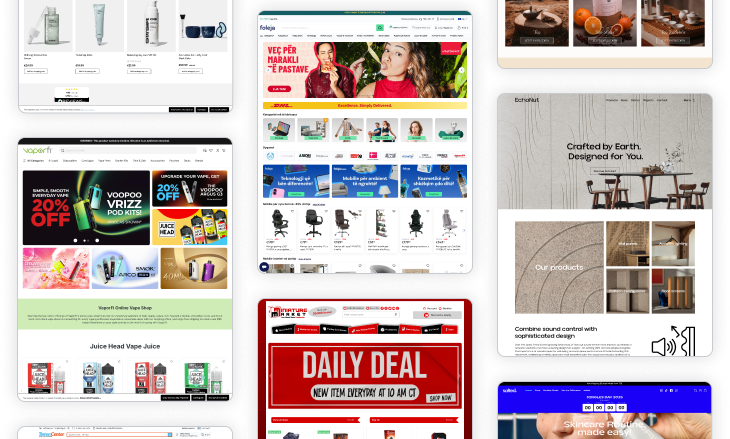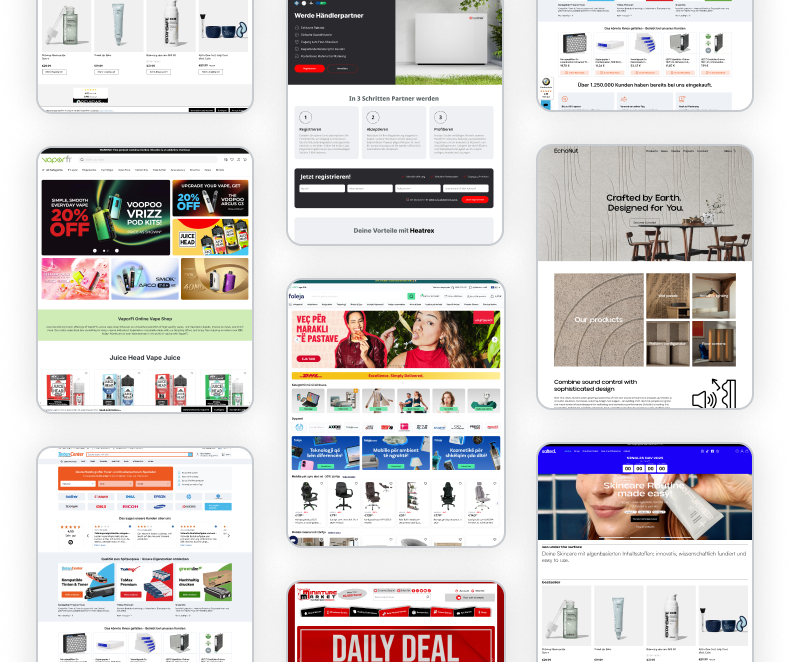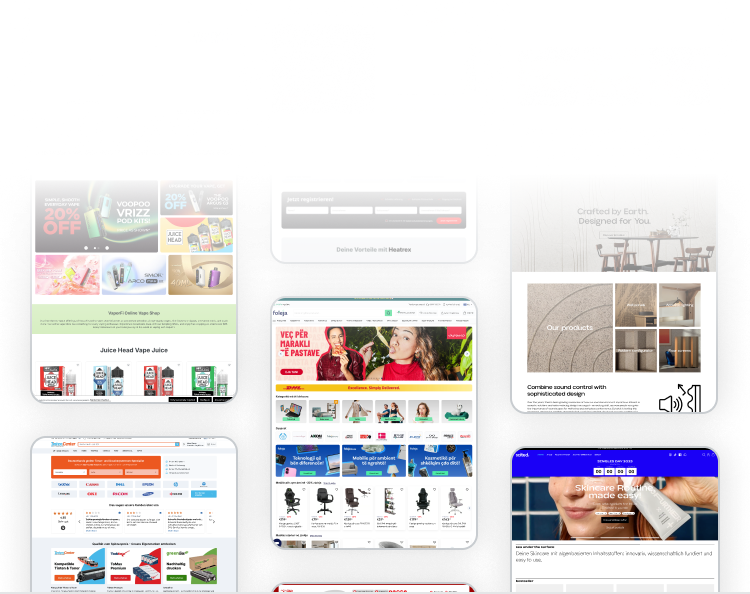We support you from planning to launch and beyond. From migration and development to optimization, we turn your ideas into a scalable Shopware solution.





Our certified team brings proven expertise in Shopware, delivering successful stores and building a reliable foundation for growth.
Our designers use the latest trends to craft intuitive Shopware experiences, whether refreshing an existing shop or creating a new one that leaves a lasting impression.
We use Shopware’s marketing tools to build tailored plans that align with audience, competitors, and goals, unlocking the full potential of each store.
Our agency provides reliable hosting and maintenance for Shopware stores, ensuring fast performance, strong security, and minimal downtime.
Shopware 6 is a future‑ready, flexible, and scalable e‑commerce platform that helps your business grow.
Orders migrated
Customers migrated
Products migrated
Shopware 5 support has officially ended. Our team provides a smooth and secure migration to Shopware 6, transferring data, settings, and plugins quickly and without complications.
Learn MoreWould you like to make your shop more individual? We'll help you seamlessly transfer all data, products, and settings so you can resell without disruption.
Learn MoreAre you looking for a smooth migration from Magento to Shopware 6? Our experts have years of experience in Magento to Shopware migration and will ensure that your new shop works flawlessly.
Learn MoreEnjoy the advantages of Shopware 6 by migrating your e-commerce platform from OXID to Shopware 6. With our support, the migration is carried out quickly and easily so that you can serve your users without interruption.
Learn Moresolution25 brings together some of the brightest minds in the industry, working tirelessly to deliver results that go beyond expectations. Their relentless drive redefines goals, while their supportive and positive approach makes even complex challenges feel achievable. With intelligence, dedication, and a strong focus on client success, solution25 creates an environment where growth becomes natural and attainable.

Foleja partnered with solution25 to build a unified marketplace in Southeast Europe, connecting thousands of sellers with integrated payments and an improved shopping experience. Today, Foleja is the region’s largest marketplace, built for growth and long-term success.

solution25 proved to be an exceptional partner from the start. Their remarkable team led our Shopware migration with precision, dedication, and genuine care going well beyond the brief to deliver an outstanding result. They didn’t just execute technically; they took ownership of our objectives, not just our code. s25 deftly aligned the solution around our long-term business strategy. Working with solution25 is what an agency experience should be like.

solution25 excellently managed the project's complexity and delivered a high-functioning and user-friendly website, which helped increase traffic and conversions. They coordinated ideas, deadlines, and tasks through Jira. Their skills, diligence, and support helped secure future partnerships.

Working with solution25 was an excellent experience. They implemented our new Shopify shop in record time, and the results were visible right away. Conversions went up, pagespeed improved significantly, and the overall shopping experience became much smoother. Their efficiency and professionalism made the entire process easy, and the outcome exceeded expectations.

With the team behind the programming of konforo, we have made a real stroke of luck. Even our complicated ideas, which were sometimes not easy to understand, were implemented with a lot of patience and expertise. We particularly appreciate the flexibility: New requests or changes are quickly taken up and reliably implemented. You can tell that the team is not only programming, but also looking for the best solutions together with us. This makes collaboration fun and ultimately brings exactly the results we imagine.



Shopware is a flexible open-source ecommerce platform for B2C and B2B. From small shops to multi-channel setups, it offers easy product management, customizable storefronts, marketing tools, and smooth integrations to grow your business.






Free 15 min initial consultation directly with our experts.
Shopware is a powerful open-source eCommerce platform that has rapidly become the go-to solution for agencies and developers seeking a flexible, API-first, and scalable alternative to legacy systems. With Shopware 6, advanced B2B features, a vibrant ecosystem, and robust SEO capabilities, it’s ideal for businesses looking to grow online. In this post, we explain everything from its technical architecture to its migration advantages and costs; plus how agencies like solution25 can help implement it successfully.
If you’re a business owner looking for a future-ready eCommerce solution that grows with you, Shopware is worth your attention. Unlike rigid platforms that force you into a fixed way of operating, Shopware gives you flexibility, performance, and control; without adding unnecessary complexity. Originally developed in Germany and trusted by thousands of merchants across Europe, Shopware is now expanding rapidly in the U.S. and globally. It is an open-source platform created specifically for companies that want to scale without limits; whether you’re launching your first online store or managing an international operation.
At solution25, we help clients migrate to Shopware because it works for businesses, not just developers or agencies. Its API-first architecture means it adapts to your needs; allowing you to integrate tools, build a headless storefront, and automate processes within one cohesive system. What makes Shopware especially powerful is its ability to support both B2C and B2B models seamlessly. It offers customizable workflows and scalable features; giving you the freedom to design a customer journey that reflects your brand and your business goals. Whether you’re building a multi-store setup, a global marketplace, or a niche online boutique, Shopware gives you the infrastructure needed to meet today’s eCommerce expectations and prepare for tomorrow’s growth. And with a dedicated partner like solution25 guiding your transition, you don’t just get a platform; you get a smarter, more sustainable way to scale your business.
Shopware was founded in 2000 by Stefan and Sebastian Hamann. Initially developed as a classic on-premise solution, the platform has continuously evolved to meet the shifting needs of digital commerce. With the launch of Shopware 6 in 2019, the platform underwent a complete architectural transformation, embracing API-first principles and focusing on usability, modularity, and extensibility.

Shopware 6 marked a major shift: it introduced a brand-new tech stack based on Symfony and Vue.js, aligning with modern development standards. This evolution opened the doors for seamless integration with third-party tools, headless frontends, and advanced personalization logic.


Shopware is the right choice for businesses that want to sell online with more control, flexibility, and long-term scalability. Whether you’re just starting out or already running a complex retail operation, Shopware adapts to your needs and supports your growth at every stage.
At solution25, we often work with clients who feel limited by platforms like Magento, WooCommerce, or Shopify. Shopware offers them a refreshing alternative; one that combines ease of use with enterprise-level performance. Because it’s open-source, businesses can choose to self-host and fully customize their store without license fees. And for growing companies with more complex needs, Shopware offers managed cloud and enterprise options with premium support. In 2025, Shopware isn’t just a tool for developers; it’s a strategic advantage for businesses that want to move fast, adapt to trends, and stay ahead of the competition.
In today’s competitive e-commerce market, staying ahead means building a store that works smarter, faster, and more efficiently. That’s where Shopware integrations come in; and why solution25 is the ideal partner to help you succeed.
This summary introduces the highlights of how Shopware plugins and integrations can transform your operations, from payment solutions and marketing automation to ERP, CRM, and advanced analytics. Each tool plays a role in creating a connected ecosystem that simplifies your workflows and delights your customers.
What sets solution25 apart? We don’t just install integrations, we craft custom solutions that fit your unique vision.
Ready to see what’s possible? Visit our Guide to Shopware Plugins & Integrations to learn more.
B2B eCommerce is no longer a niche it’s a dominant force in the digital economy, and Shopware has recognized this shift with a dedicated suite of features for business-to-business transactions. As of 2025, Shopware has evolved into one of the most reliable platforms for B2B businesses looking to scale online operations. Whether you’re a wholesaler, manufacturer, or enterprise supplier, Shopware provides the tools needed to support complex buying processes, customer hierarchies, and pricing strategies.
[cta_shop1]
Unlike B2C, B2B commerce involves larger order volumes, negotiated pricing, and complex approval workflows. Buyers are often companies rather than individuals, and transactions frequently require personalization and flexibility in payment and delivery options.
A packaging supplier uses Shopware’s B2B features to allow distributors across Europe to log in, view personalized catalogs, and place bulk orders with negotiated pricing—streamlining operations and reducing manual overhead.
When it comes to B2B eCommerce, the expectations are higher. Businesses need custom pricing, role-based permissions, account management tools, and purchasing processes that are far more complex than standard online shops. For agencies working on these types of projects, Shopware offers the right foundation. At solution25, we work with B2B companies that are ready to move away from outdated systems and slow manual processes. Shopware allows us to deliver advanced solutions faster because it already includes many B2B features from the start; this reduces custom development time while keeping the flexibility to add tailored modules when needed. With Shopware’s Evolve and Beyond editions, agencies and their clients also gain access to priority support, advanced capabilities, and long-term scalability. It’s a reliable choice for companies that want their digital infrastructure to support sales teams, procurement departments, and large-volume buyers without added complexity. Unlike traditional B2B suites that are often expensive and inflexible, Shopware gives you the control to customize your workflows without being locked into one way of doing business. Its modular structure allows your platform to grow and adapt; making it a smart investment for companies planning to scale. In short, Shopware is the platform that allows agencies like solution25 to help B2B businesses digitize confidently without compromising on performance, cost-efficiency, or long-term maintainability.
[cta_shop2]
Shopware vs Magento: Magento has long been considered a powerful platform for large-scale online stores. It supports deep customization, enterprise-level performance, and a large ecosystem. However, the cost of running Magento especially Adobe Commerce is high. Development is complex, maintenance is resource-intensive, and businesses often face long deployment timelines.
Shopware 6 offers similar flexibility with significantly lower overhead. Built as an open-source eCommerce platform with a modern, API-first architecture, Shopware supports complex business models, headless commerce implementations, and scalable eCommerce stores. For mid-sized companies and fast-scaling brands, Shopware provides a more efficient path to advanced features without the licensing burden of Adobe Commerce.
Shopware vs Shopify: Shopify remains a popular choice in the D2C space due to its ease of use, fast setup, and robust app marketplace. It is an ideal starting point for small to medium-sized businesses that need a simplified solution. However, Shopify’s closed ecosystem limits customization. It lacks native support for complex B2B eCommerce functions, and its capabilities in multilingual, multi-store, or composable commerce setups are limited.
Shopware 6 is a more flexible platform built for scalability. It is better suited for businesses that require full ownership of their infrastructure, deeper integration logic, or advanced frontend control through headless commerce. Shopware’s native B2B Suite, internationalization tools, and structured data handling provide a serious advantage for companies ready to grow beyond the basics.
Shopware vs WooCommerce: WooCommerce is a widely used solution for small businesses already running WordPress websites. It offers quick entry into the eCommerce space and access to a broad plugin marketplace. But as store requirements become more complex, WooCommerce’s limitations become clear. Performance bottlenecks, security vulnerabilities from third-party plugins, and lack of structure often lead to scalability issues.
Shopware is purpose-built to support growth. With its modular core, centralized management of catalogs, customers, and orders, and native support for multi-language and multi-currency stores, it serves as a strong foundation for serious online businesses. Shopware 6 also offers more robust architecture for developers, which reduces long-term technical debt compared to WordPress-based setups.
As a Shopware agency, we’ve built everything from custom plugins to full B2B and D2C storefronts on Shopware 6. But we’re not platform loyalists. Shopify is still a better choice for rapid deployment and simple online shops. Magento can outperform in highly customized, global enterprise environments. WooCommerce works well for small content driven stores.
Shopware stands out when flexibility, control, and scalability are required; particularly for businesses in Europe, or those planning to expand internationally. Its open-source foundation, API-first architecture, and robust feature set make it one of the best eCommerce platforms for 2025.
At solution25, our job is to assess your goals, complexity, and future plans; then recommend and implement the eCommerce solution that fits. Sometimes that’s Shopware. Sometimes it’s not. That’s what makes us trusted Shopware experts and not just another agency.

Migrating to a new eCommerce platform is a high-impact strategic decision. Shopware 6 has become a leading choice for businesses seeking freedom from rigid SaaS structures, greater scalability, and full ownership of their digital commerce stack. A successful migration is not just about transferring data; it involves rethinking architecture, preserving SEO equity, and enabling future growth through a more flexible and composable system.
These features make Shopware one of the most powerful and scalable eCommerce platforms in 2025.
Every migration is treated as a full-stack transformation; not just a database transfer. The process is structured in phases to reduce risk, increase data integrity, and maximize performance after launch.
| Migration Path | Why Migrate? | Key Benefits of Shopware 6 |
|---|---|---|
| Shopware 5 → Shopware 6 | End-of-life platform, outdated stack, limited flexibility | Modern architecture, Rule & Flow Builder, seamless upgrade path |
| Shopify → Shopware 6 | SaaS restrictions, limited B2B functionality, lack of control | Full ownership, headless-ready, powerful B2B capabilities |
| Magento → Shopware 6 | Complex maintenance, high development costs, slow time-to-market | Lower cost of ownership, easier management, faster deployments |
| Oxid → Shopware 6 | Aging tech, poor integration support, limited scalability | Modular setup, rich plugin ecosystem, scalable architecture |
How do you want to sleep the night before launch? Confident. Because we’ve gone through this proven process together.
Replatforming is more than just migrating data it’s about transforming the way your business operates online.
For many companies, outdated platforms have become a bottleneck, limiting growth, flexibility, and customer experience. Whether you’re coming from Shopify, Magento, WooCommerce, or a proprietary system, Shopware offers a compelling reason to switch in 2025. Its API-first, modular architecture allows you to modernize your digital infrastructure while minimizing technical debt and operational risks.
Wwe approach replatforming as a strategic partnership. From discovery to deployment, every step is mapped out to ensure minimal disruption and maximum future-readiness.
One of the most critical aspects of this process is data migration—the careful extraction, transformation, and reintegration of all your store’s essential information. Think of it as moving homes: you don’t just toss everything into boxes and hope it fits the new space you curate, optimize, and redesign to fit your new lifestyle.
We begin with a technical audit that identifies pain points, from performance limitations to plugin clutter. Then, our team creates a migration blueprint that includes not only product data and orders but also SEO configurations, category structures, and customer records.
This is where platforms like Magento often fall short migration can be complex, costly, and slow. Shopware simplifies this by offering migration tools and flexible APIs, making the transition smoother and more cost-effective.
Key tools like the Visual Rule Builder and Flow Builder also help automate post-migration processes, so you don’t lose operational momentum.
Whether you need to sync inventory, set up marketing automations, or manage multi-store environments, Shopware offers native capabilities that would require third-party add-ons in other platforms.
Our methodology includes full integration with providers like PayPal, Stripe, and Klarna, so your financial workflows continue without friction.
It’s not about “selling Shopware”—it’s about presenting it as the smartest tool for the job.
If you’re still hesitant, think of replatforming in simple terms: it’s like switching from a basic toolset to a smart, automated workstation.
Yes, there’s a transition but the long-term gains in flexibility, performance, and peace of mind far outweigh the short-term adjustments.
We begin with a full technical audit of your current eCommerce platform. This includes analysis of custom modules, plugin dependencies, category logic, and SEO configurations. We map all business rules, identify platform limitations, and define what can be improved or removed in the new Shopware environment.
[cta_shop1]
All data is migrated through custom-mapped pipelines. We extract and clean product information, customer records, order history, categories, CMS content, and SEO metadata. Redundant or corrupted entries are removed. Legacy URLs are rebuilt into SEO-friendly Shopware routes based on structured logic.
We evaluate which frontend approach suits your business best. This could be a traditional Storefront, a headless frontend, or a PWA. Our design team recreates or upgrades your UI while focusing on usability, accessibility, and conversion rate optimization. All themes are custom-coded and performance tested.
External services such as ERP, CRM, payment gateways, shipping providers, and marketing platforms are reconnected through Shopware’s API. We use middleware if needed to ensure synchronization between systems. This step also includes setting up services like content delivery networks or advanced caching tools.
We implement 301 redirects to protect your existing SEO performance. All structured data is validated and migrated, including schema markup and metadata. Our team runs a full SEO audit after migration and corrects any technical SEO issues that may arise.
Before launch, we perform cross-device testing, data integrity validation, transactional testing, and stress testing. During the go-live phase, our team monitors all system functions in real time and handles final adjustments. After launch, we conduct post-launch QA and provide performance reporting.
At solution25, we understand that secure flexible payment management is essential for modern commerce. As digital transactions grow in volume and complexity, merchants need a way to manage risk proactively without sacrificing checkout speed or customer satisfaction. That is why we integrate dynamic rule based risk management into Shopware through our Smart Protection module, powered by the advanced plugin from RECI IT Solutions. This comprehensive solution enables online retailers to define and apply custom visibility rules for payment methods based on real time customer profiles, past order history and current cart details.
Using the intuitive Shopware Rule Builder interface, store owners can craft conditions that show or hide options such as invoice, credit card, prepayment, Twint or purchase on account according to thresholds like total spend, outstanding balances, repayment behavior and other trust indicators. Built on scalable architecture, the Smart Protection module supports high traffic stores without slowing checkout, and it adheres to GDPR and PCI compliance standards. Merchants can access detailed audit logs and risk analytics in the backend, export reports for finance teams and refine their strategies over time. Integration with popular third party fraud detection services is also available, offering an additional layer of verification when needed.
This module is fully compatible with Shopware versions 6.5 and 6.6. It comes with a free monthly trial, continuous updates through subscription and detailed documentation to support rapid onboarding. RECI IT Solutions, the Swiss based developer behind the plugin, maintains a stellar average rating of 4.9 and offers responsive support to address any questions or special requirements. Whether you operate a boutique store or a global enterprise, this solution scales to meet your needs. A quick installation via the Shopware store takes minutes, and our team can guide you through advanced configuration or custom rule development as required.
Common use cases include limiting invoice availability for customers with open balances above a set amount, granting credit card access only for high value orders, or offering special payment methods to loyalty members who meet precise spending criteria. The outcome is lower fraud rates, optimized cash flow, personalized checkout flows and stronger customer loyalty.
With solution25’s Smart Protection you gain a flexible shield that empowers you to manage payment risk dynamically while building trust and driving growth in your Shopware store.
System testing is executed across environments to ensure stability. This includes mobile responsiveness, transaction flow, third-party sync, and data accuracy. Launch is supported with real-time monitoring, error tracking, and fast rollback options if needed. Post-launch includes a QA round and early performance tuning.
This guide explores the benefits of running Shopware on Platform.sh’s PaaS, a Git-driven, container-based infrastructure designed for modern e-commerce. Shopware PaaS offers developers full control of their Shopware environments while offloading infrastructure and DevOps tasks. Key features include auto-scaling, CI/CD pipelines, multi-cloud support, built-in services (like Redis, Elasticsearch, and RabbitMQ), and high availability, enabling seamless deployment, rapid development, and reliable performance.
Each Git branch becomes a live environment, allowing fast testing and feature releases. Platform.sh handles routing, SSL, and provisioning for all services, while developers focus on code and plugins. Setup involves configuring YAML files, defining build/deploy hooks, and pushing code to trigger automatic deployments and migrations. The architecture isolates app, DB, and service containers for better performance and fault tolerance.
Success stories from agencies like basecom and solution25 demonstrate dramatic reductions in DevOps effort and improved scalability. Compared to SaaS or self-hosted options, Shopware PaaS offers the best balance of flexibility and ease, ideal for large, customizable shops. Best practices include using Composer for plugins, enabling caching/CDNs, and tracking performance with Blackfire. Ultimately, Shopware PaaS empowers teams to scale faster and manage complex e-commerce projects more efficiently.
[cta_shop1]
At solution25, we offer tailored Shopware cloud setups that combine performance, security, and ease of maintenance for scaling businesses.
Shopware Integrations for the US Market
solution25 builds advanced Shopware plugins tailored to the needs of modern e-commerce stores. From payment gateways to logistics and customer engagement tools, our solutions help Shopware merchants optimize performance, streamline operations, and increase conversions. Each integration is developed with scalability, compliance, and real business impact in mind. Each plugin title below is clickable and links to a dedicated page with more details, features, and installation instructions.
A good agency ensures your Shopware project is delivered on time, within scope, and built to grow. Look for certified Shopware partners with relevant case studies, technical depth, and end-to-end support offerings.
When it comes to launching, migrating, or scaling a Shopware project, your agency partner can make or break the outcome. solution25 is not just a Shopware agency; we’re a certified partner with years of proven experience helping clients leverage the full potential of Shopware 6 across both B2B and B2C projects.
solution25 has been developing with Shopware since its early releases and has a deep understanding of both the platform’s core and the custom solutions that today’s businesses require. From startups needing a clean launch to large enterprises seeking advanced features and ERP integrations, our team has delivered scalable, high-performing stores across industries.


Behind every successful eCommerce platform is a team of developers who either love it or hate it.
Fortunately, Shopware is designed with developers in mind, which is one of the main reasons agencies like solution25 recommend it so often.
At the heart of Shopware’s developer appeal is its API-first architecture.This approach allows teams to build completely custom frontends whether that’s a progressive web app (PWA), headless storefront, or mobile-first experience.Unlike monolithic platforms that force developers to work within rigid templates, Shopware offers flexibility and control without compromising structure. Developers also appreciate Shopware’s use of Symfony and Twig, both modern frameworks that are widely supported and well-documented.This means quicker onboarding for new devs and easier maintenance over time. Plus, its modular structure allows teams to build and maintain features like plugins, themes, and workflows independently, minimizing cross-dependencies and reducing bugs.
During interviews with our own team, one insight stood out: Shopware’s plugin system is incredibly well-thought-out.It allows for scalable customization that doesn’t break with every update—something developers dread in platforms like WooCommerce or even Shopify (especially when using third-party apps). Shopware also provides developers with a full test suite, detailed logging, and built-in performance tools.With tools like the Administration API, Store API, and Flow Builder, teams can automate everything from order workflows to shipping logistics—all while preserving clean code and business logic separation. And for developers working on US-based projects, the ability to integrate local tax providers, payment processors (like PayPal and Stripe), and fulfillment services is a huge plus.The platform is already equipped to handle US-specific needs like sales tax calculation, multi-state inventory, and compliance standards.
Because a happy developer team means faster delivery times, cleaner code, fewer bugs, and easier long-term scaling.
Shopware reduces the friction between business goals and technical execution, enabling your tech team to focus on innovation instead of constant patching.
From enhancing site performance by 80% to tripling conversion rates through UX and SEO improvements, our case studies demonstrate the measurable value we bring to Shopware projects. Clients across Europe and the US trust solution25 to deliver not only on time and on budget, but beyond expectations. If you’re seeking a certified, reliable, and innovative Shopware agency to bring your next project to life solution25 is your ideal partner. Get in touch today and let’s build something extraordinary with Shopware.